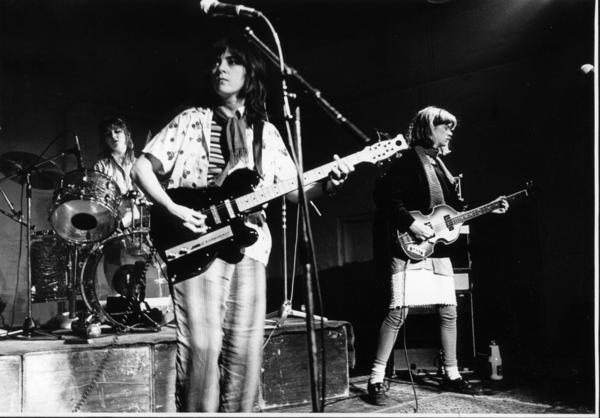As years go, 1979 was a potent one for music. The year that brought Thatcher to power also saw, among others, the release of PiL’s Metal Box, Gang of Four’s Entertainment, The Fall’s Live at the Witch Trials and Talking Heads’ Fear of Music.
Its riches have since been plundered and picked over by hordes of millennial youth who went searching for fresh reference points. Of the various vintage sounds on offer for reconsideration throughout this decade, it’s been the original post-punk era which has proved irresistible to those who spent their early teens watching the previous decade’s alt-rock and Britpop blitz from the sidelines; (often with little more than well-thumbed copies of various music weeklies, or Spin — depending on which side of the Atlantic you found yourself — as their main source of information).
We’ve seen a full-blown post-punk revival as critics dusted off the word ‘angular’ and began firing it at every fresh-faced hi-hat abuser who happened to wander into their crosshairs. Yet even though the release of numerous reissues and compilations — including Soul Jazz Records’ mighty In the Beginning There Was Rhythm — offered a wealth of possible signposts for people to follow, the wagon jumpers more often than not set their myopic sights on either Gang of Four’s spiky guitars and mutant funk, or Joy Division’s northern gloom.
Post-punk is now a clearly defined, entrenched category instead of the loose umbrella term it once was. It’s a point Alex Ogg rightfully took to task recently on this site — not that Simon Reynolds’ Rip it Up and Start Again should be to blame. Reynolds’ take on those fertile late-70s, early-80s bands is an excellent primer for anyone in search of an understanding that extends beyond the list of similar artists on a Spotify side-bar. Its strengths shouldn’t be denied.
Those who lived it may indeed have seen it as punk at the time, but hindsight does draw a line between those who kicked the door down and those who came flooding in after. And among the legions of first wave DIY innovators and wannabe-iconoclasts who arose in the wake of punk, it’s perhaps the humble Raincoats, and their recently reissued debut, that best embody what post-punk could and should mean.
For those looking to grasp the ‘why’ then it’s best to start with Gina and Ana. In late 1976, Gina Birch was a young woman from Nottingham who relocated to London to study art. Once there, she met Ana Da Silva, a fellow student from Portugal, eight years Birch’s senior, with a doctorate in language who’d already written a dissertation on Bob Dylan. Both made their way around the nascent punk scene in London and both were galvanised into action by the power of the DIY ethos and their exposure to early gigs by the likes of the Slits.
Joined in their embryonic stage by a rotating case of additional members, including a pre-PiL Richard Dudanski on drums, the band eventually settled on an all female line-up that included former Slits’ drummer Palmolive and classically trained violinist Vicky Aspinall – who reportedly answered an ad looking for a musician with ‘no style but strength’. The line-up finally cemented, the quartet made their way around the London circuit, put out early single ‘Fairytale in the Supermarket’ and eventually went on tour before heading into the studio to record their 1979 eponymous debut.
The Raincoats’ history follows a similar trajectory to many from the era. Yet as Sonic Youth’s Kim Gordon acknowledges in the liner notes she wrote, alongside uber-fan Kurt Cobain, for the early 90s reissues of The Raincoats’ catalogue, they were a band of ordinary people who, lacking the trappings and poses of many of their peers, created something extraordinary.
Unwilling to subvert male fantasies like the leather-clad Siouxsie Sioux or mud-covered Slits; avoiding the political bent of the Au Pairs; and free of the heavy weight of history that John Lydon’s brand of confrontationalism needed to prop itself against to work, The Raincoats is marked by its refusal to brazenly rattle the bars (‘Off Duty Trips’ subject matter – an infamous rape trial of the time – being the main exception here). Sidestepping the inherent feedback loop of reactionary gestures, The Raincoats is the sound of a band still flush with the thrills found in their recently discovered creative powers. Filled with yelping vocals, shambolic tension, the tribal din of Palmolive’s drumming – which would make way for Robert Wyatt and This Heat’s Charles Hayward on follow up LP, Odyshape – and a skeletal cover of The Kink’s ‘Lola,’ the band’s debut puts the stress firmly on the ‘post’ in the post-punk equation.
Charged up by the break from pop’s feudal nature that punk offered, inspired by its ability to eradicate exterior and self-imposed constraints, The Raincoats were one of the few groups of the time to understand the true power that lay behind the limitless possibilities available in the wake of punk’s initial splash. And they grasped it at an instinctual, emotional level, instead of the more fashionable theory driven or confrontational routes; operating in a place that was surprisingly free of outside influences. The result is a work that, defined solely by the creative urges of its makers, dwells in a tradition that’s uniquely its own.
For the majority of this decade’s revivalists, The Raincoats offered few easy angles for them to latch onto. Not particularly stern or rhythmic, not remotely aggressive and not overtly intellectual, the brackets that surround current notions of post-punk barely apply to the band. But if post-punk is about freedom, freedom of expression, freedom to explore, freedom from constraint, then the Raincoats’ legacy lives on. Not in the parasitic fashionistas, but in the legions of scruffy misfits who continue to strive and reach beyond their limits as they attempt to carve out a space of their own.



